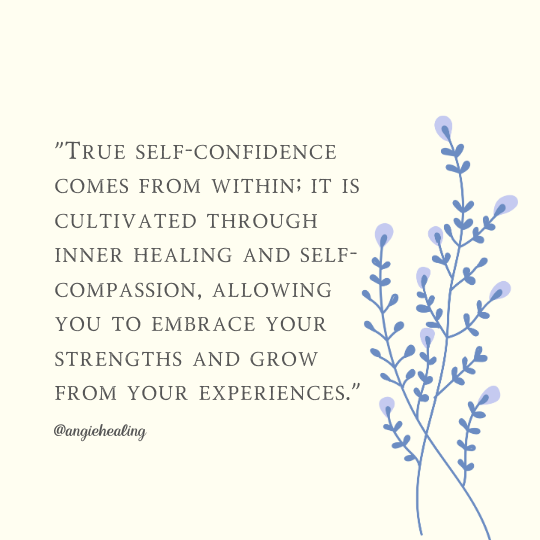Self-confidence is a vital component of a fulfilling life. It affects our ability to pursue goals, form meaningful relationships, and navigate challenges. However, many people struggle with self-confidence due to past experiences, societal pressures, and negative self-perception. This blog post will delve into the importance of building self-confidence, the role of the nervous system in this process, and practical strategies to heal and enhance self-assurance.
Understanding Self-Confidence
Self-confidence is the belief in one’s abilities, qualities, and judgment. It is the foundation upon which we build our actions and decisions. While some level of self-doubt is normal, a chronic lack of self-confidence can impede personal and professional growth.
Factors Influencing Self-Confidence
- Past Experiences: Negative experiences, failures, and criticism can erode self-confidence over time.
- Self-Perception: How we view ourselves significantly impacts our confidence levels. Negative self-talk and low self-esteem are common obstacles.
- Social Influences: Societal expectations, peer pressure, and cultural norms can shape our self-confidence, often creating unrealistic standards.
- Personality Traits: Certain personality traits, such as introversion or sensitivity, can affect how confident we feel in various situations.
The Role of the Nervous System in Self-Confidence
The nervous system plays a crucial role in how we perceive ourselves and respond to challenges. Understanding this connection can help us develop strategies to enhance self-confidence and promote emotional healing.
The Autonomic Nervous System (ANS)
The ANS regulates involuntary physiological functions, including heart rate, digestion, and respiratory rate. It comprises two main branches:
- Sympathetic Nervous System (SNS): Activates the “fight or flight” response during perceived threats or stress.
- Parasympathetic Nervous System (PNS): Promotes the “rest and digest” state, aiding relaxation and recovery.
When we experience self-doubt or face challenging situations, the SNS can become overactive, leading to heightened physiological arousal and stress. Conversely, engaging the PNS can help reduce stress and promote a sense of calm, making it easier to build self-confidence.
Polyvagal Theory
Dr. Stephen Porges’ Polyvagal Theory offers insights into how the nervous system influences our emotional and social behaviors. It highlights the role of the vagus nerve in regulating stress responses and social engagement. According to this theory, our nervous system has three states:
- Social Engagement System: When we feel safe, we can connect with others and ourselves with confidence and empathy.
- Fight or Flight Response: Triggered by perceived threats, leading to heightened arousal and self-protective behaviors.
- Shutdown or Freeze Response: In response to extreme threat or overwhelm, leading to dissociation and withdrawal.
Understanding these states can help us recognize when self-doubt is driven by an overactive stress response and how to shift towards a more confident state.

Strategies to Build Self-Confidence
1. Identifying and Challenging Negative Self-Talk
The way we talk to ourselves significantly influences our self-confidence. Negative self-talk often goes unnoticed but can have a profound impact on our self-esteem. To build self-confidence, start by:
- Identifying Negative Thoughts: Pay attention to your inner dialogue. Notice when you’re being self-critical and what triggers these thoughts.
- Challenging Negative Beliefs: Question the validity of these negative thoughts. Are they based on facts or assumptions? Would you say these things to a friend in a similar situation?
- Replacing Negative Thoughts: Replace self-critical thoughts with more compassionate and realistic ones. For example, instead of saying, “I’m not good enough,” try, “I am capable and can learn from my experiences.”
2. Practicing Self-Compassion
Self-compassion involves treating yourself with the same kindness and understanding that you would offer to others. It consists of three key components:
- Self-Kindness: Be gentle with yourself, especially during times of struggle. Acknowledge your efforts and offer yourself comfort and care.
- Common Humanity: Recognize that everyone makes mistakes and experiences difficulties. You’re not alone in your struggles.
- Mindfulness: Be aware of your thoughts and feelings without judgment. Accept them as they are, rather than trying to suppress or ignore them.
Exercises to Cultivate Self-Compassion
- Loving-Kindness Meditation: Spend a few minutes each day sending kind and loving thoughts to yourself and others.
- Compassionate Letter Writing: Write a letter to yourself from the perspective of a compassionate friend, offering understanding and support.
- Self-Compassion Breaks: Take short breaks throughout the day to remind yourself to be kind and understanding towards yourself.
3. Engaging the Parasympathetic Nervous System
Activating the PNS can help reduce stress and promote a sense of calm, making it easier to build self-confidence. Techniques include:
- Deep Breathing: Practice slow, deep breathing to activate the PNS. Try inhaling for a count of four, holding for four, exhaling for six, and holding for two.
- Progressive Muscle Relaxation: Tense and then slowly release different muscle groups in your body to reduce tension and promote relaxation.
- Mindful Movement: Engage in activities like yoga, tai chi, or gentle stretching to connect with your body and promote relaxation.
4. Setting Realistic Goals and Celebrating Achievements
Setting and achieving realistic goals can boost self-confidence by providing a sense of accomplishment and progress. To do this:
- Set SMART Goals: Specific, Measurable, Achievable, Relevant, and Time-bound goals can help you focus on attainable objectives.
- Break Down Goals: Divide larger goals into smaller, manageable steps. This makes the process less overwhelming and allows you to celebrate incremental achievements.
- Reflect on Progress: Regularly review your progress and acknowledge your accomplishments. Celebrating small victories can enhance your confidence and motivation.
5. Cultivating a Growth Mindset
A growth mindset is the belief that abilities and intelligence can be developed through dedication and hard work. This perspective can help build self-confidence by:
- Embracing Challenges: View challenges as opportunities for growth rather than threats to your self-worth.
- Learning from Mistakes: See mistakes as valuable learning experiences. Reflect on what you can learn and how you can improve.
- Persistence: Stay committed to your goals despite setbacks. Understand that progress takes time and effort.
Techniques to Foster a Growth Mindset
- Reflect on Personal Growth: Regularly reflect on your progress and the lessons learned from challenges and setbacks.
- Reframe Negative Thoughts: When faced with a setback, reframe your thoughts to focus on what you can learn and how you can grow.
- Celebrate Effort: Acknowledge and celebrate the effort you put into your tasks, regardless of the outcome.
6. Visualization and Affirmations
Visualization and affirmations can be powerful tools to build self-confidence by reinforcing positive beliefs and mental imagery.
- Visualization: Spend a few minutes each day visualizing yourself successfully achieving your goals. Imagine the details of your success and how it feels to accomplish your objectives.
- Affirmations: Create positive affirmations that reflect your desired self-image and repeat them daily. For example, “I am confident and capable” or “I believe in myself and my abilities.”
7. Seeking Support
Building self-confidence is not a journey that you need to undertake alone. Seeking support from others can provide valuable perspective and encouragement. Consider:
- Talking to a Trusted Friend or Family Member: Share your feelings and goals with someone you trust. They can offer empathy, encouragement, and constructive feedback.
- Professional Help: A therapist or counselor can provide guidance and techniques to build self-confidence. They can help you address underlying issues and develop healthier thought patterns.
- Joining Support Groups: Engage with communities or groups that share similar goals. This can provide a sense of belonging and mutual support.
Integrating Havening Techniques and Hypnosis
Incorporating advanced therapeutic techniques like Havening Techniques and Hypnosis can further support the development of self-confidence. These methods can help rewire the brain and calm the nervous system.
Havening Techniques
Havening Techniques are a form of psychosensory therapy designed to help individuals process and release traumatic memories and reduce anxiety. By creating a sense of safety in the body, Havening can help calm the nervous system and enhance self-confidence.
- Self-Havening: Use gentle, soothing touch on your arms, face, and hands while thinking about self-soothing thoughts or visualizing a peaceful scene.
- Havening with a Practitioner: Working with a certified Havening Techniques practitioner can provide more targeted and personalized support for building self-confidence.
Hypnosis
Hypnosis is a therapeutic technique that involves guiding individuals into a relaxed, focused state where they can access their subconscious mind. It can be used to address negative self-talk and reinforce positive beliefs.
- Self-Hypnosis: Practice self-hypnosis by using guided imagery or relaxation scripts to reinforce positive affirmations and enhance self-confidence.
- Hypnotherapy: Working with a certified hypnotherapist can help address deep-seated negative beliefs and promote self-compassion and healing.
Healing the Nervous System to Boost Self-Confidence
Healing the nervous system is integral to building self-confidence. By reducing chronic stress and promoting a balanced nervous system, we can create a foundation for greater emotional resilience and self-assurance.
Techniques for Nervous System Healing
- Mindfulness and Meditation: Regular mindfulness practice can help calm the nervous system, reduce stress, and enhance self-awareness. Techniques such as mindfulness meditation, body scan, and mindful breathing can be beneficial.
- Physical Activity: Regular physical activity can help regulate the nervous system and improve mood. Activities like walking, running, yoga, and dance can promote relaxation and boost self-confidence.
- Adequate Sleep: Ensure you get enough restful sleep, as it is crucial for nervous system health. Poor sleep can exacerbate stress and negatively impact self-confidence.
- Healthy Nutrition: A balanced diet rich in nutrients supports overall health, including nervous system function. Avoid excessive caffeine and sugar, which can heighten anxiety and stress.
- Therapeutic Practices: Engage in therapeutic practices such as massage therapy, acupuncture, or craniosacral therapy to support nervous system health and reduce tension.
Conclusion
Building self-confidence is a journey that requires self-awareness, patience, and a multi-faceted approach. By understanding the role of the nervous system, identifying and challenging negative self-talk, practicing self-compassion, engaging the parasympathetic nervous system, setting realistic goals, cultivating a growth mindset, seeking support, and incorporating advanced therapeutic techniques, you can gradually enhance your self-confidence. Healing the nervous system and fostering a balanced state of being is integral to this process. Remember, self-confidence is not about being perfect; it’s about believing in your potential and embracing your unique journey.
Feel free to share your thoughts and experiences in the comments. How do you build self-confidence in your life? What strategies have worked for you?
Additional resources
Self-Assessment Tool: The Wheel of Life
External resources:
If you are interested in more tips and exercises to boost your self-confidence you might try visiting these sites:






0 Comments